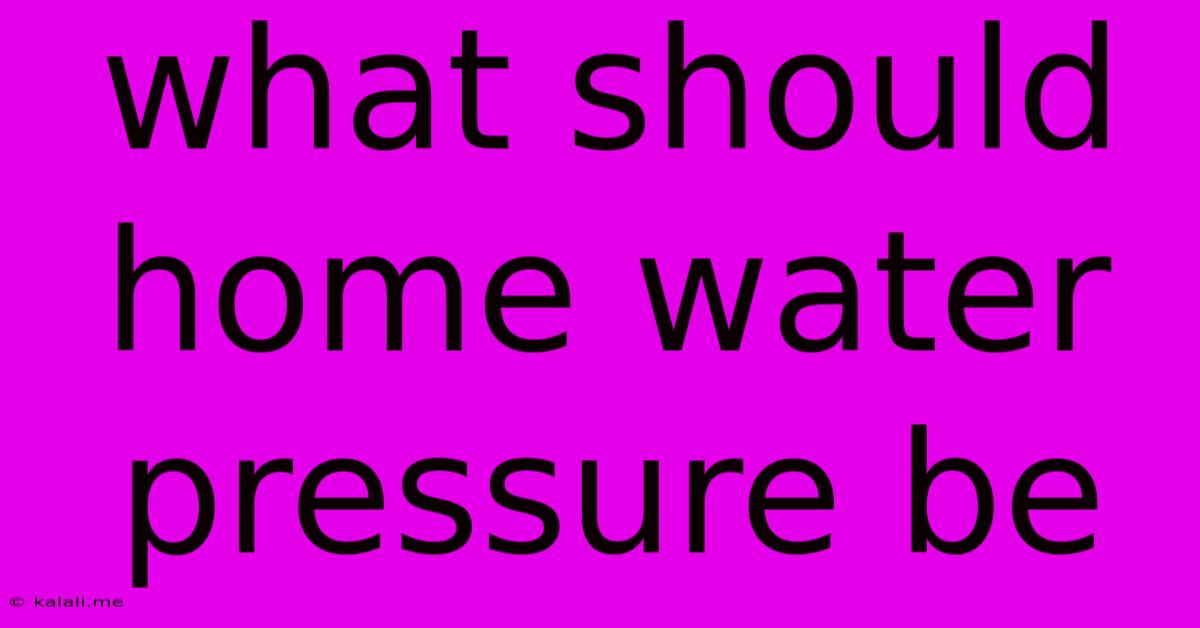What Should Home Water Pressure Be
Kalali
Jun 08, 2025 · 3 min read

Table of Contents
What Should Home Water Pressure Be? Your Guide to Ideal PSI
Maintaining the right water pressure in your home is crucial for comfortable living and the longevity of your plumbing system. Too low, and you'll experience weak showers and struggling faucets. Too high, and you risk damaging pipes and appliances. This guide will help you understand what constitutes ideal home water pressure and how to check and adjust it.
What is PSI and Why Does it Matter?
Water pressure is measured in pounds per square inch (PSI). This measurement indicates the force of water pushing against the inside of your pipes. Consistent, optimal PSI ensures efficient water flow throughout your house, providing a satisfying shower experience, effective appliance operation (dishwashers, washing machines), and preventing future plumbing issues. Understanding your home's PSI is a key aspect of home maintenance.
Ideal Home Water Pressure Range:
The generally accepted ideal home water pressure range is between 40 and 60 PSI. Anything below 40 PSI is considered low, while anything above 60 PSI is considered high. While some appliances might tolerate slightly higher pressure, consistently exceeding 80 PSI significantly increases the risk of damage.
How to Check Your Home Water Pressure:
Checking your water pressure is a simple process requiring a readily available tool: a pressure gauge. These gauges are inexpensive and can be purchased at most hardware stores.
Here's how to check:
- Turn off all water-using appliances: Ensure no water is running in the house.
- Locate your main water shut-off valve: This is usually located near the water meter, often outside your home.
- Attach the pressure gauge: Connect the pressure gauge to an outdoor faucet.
- Turn on the faucet: Slowly open the faucet to allow water to flow.
- Read the gauge: The pressure gauge will display your water pressure in PSI.
Dealing with Low Water Pressure:
Low water pressure can stem from various sources, including:
- Clogged pipes: Mineral deposits and sediment can restrict water flow.
- Leaky faucets or fixtures: Even small leaks can significantly reduce overall pressure.
- Restricted water main: A problem with the main water line leading to your home might be the culprit.
- Malfunctioning pressure regulator: This device controls water pressure entering your home.
Dealing with High Water Pressure:
High water pressure poses a more serious threat to your plumbing system. Potential causes include:
- Faulty pressure regulator: A malfunctioning regulator might allow excessive water pressure into your home.
- Water main pressure surge: Sudden increases in pressure from the municipal water supply can occur.
Solutions to Pressure Problems:
- For low pressure: Address leaky faucets, check for pipe clogs (potentially requiring professional help), and consider replacing or repairing a faulty pressure regulator.
- For high pressure: A pressure regulator repair or replacement is often necessary. This should be handled by a qualified plumber to prevent damage to your system.
Regular Maintenance is Key:
Regularly checking your water pressure is a simple preventative measure. This proactive approach helps identify problems early on, preventing costly repairs and ensuring a consistent, comfortable water supply in your home. Understanding your home's water pressure is essential for maintaining a well-functioning plumbing system and preventing future headaches. Remember, if you're unsure about any aspect of checking or adjusting your water pressure, it's always best to contact a qualified plumber.
Latest Posts
Latest Posts
-
Are Torr And Mmhg The Same
Jun 09, 2025
-
Is It Heres To Or Cheers To
Jun 09, 2025
-
Derivative With Respect To A Vector
Jun 09, 2025
-
A Verbb Formed Into A Noun Derivationl Ending Silent Consonant
Jun 09, 2025
-
What Is A Natural Hat Trick In Hockey
Jun 09, 2025
Related Post
Thank you for visiting our website which covers about What Should Home Water Pressure Be . We hope the information provided has been useful to you. Feel free to contact us if you have any questions or need further assistance. See you next time and don't miss to bookmark.